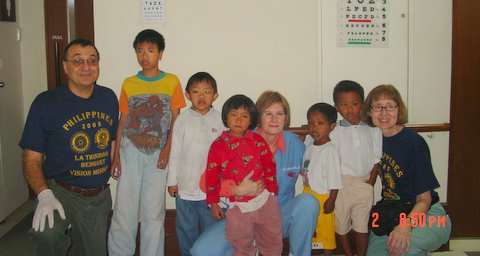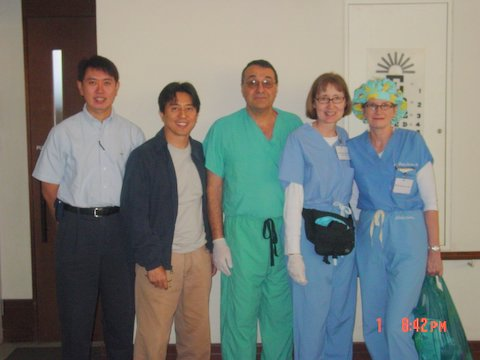
WBO Mission offers care to Filipinos disadvantaged by poverty
Special to the Ocular Surgery News By Dr. Albert A. Alley
If ever the clear link between poverty and inadequate access to medical care was evident, it was during an eye surgery mission led by World Outreach Blindness to Le Trinidad, the Philippines, from Feb. 25 to March 6. The Philippines have pockets of affluence, but also a great deal of poverty. Many people who are blind or facing blindness cannot afford eye surgery. For those who can afford it, there is a very long waiting list to receive surgical treatment. Moreover, the country has an under-financed and overwhelmed state medical system. Although World Blindness Outreach (WBO), a nonprofit organization, has conducted more than 50 eye missions in 20 countries around the world since its founding in 1990—with some countries visited more than once—this was our WBO first mission to the Philippines, a country that also suffers from political instability. (I should point out that I did, however, visit the Philippines in 1989 as a member of a Rotary-sponsored eye mission.) It was gratifying that our team, working out of Benguet General Hospital, was able to perform nearly 110 operations—82 on patients with cataracts and 27 to correct strabismus (crossed eyes) in children and adults. The latter surgery not only improves visual field and depth perception but also enhances a person’s self-esteem and possibly his or her livelihood because of the cosmetic improvement.  The team was able to include children as surgical patients because of the fortuitous participation of Merrill Staas-Isern, a pediatric ophthalmologist in private practice who teaches at Children’s Mercy Hospital in Kansas City, Missouri.  With the assistance of the Rotary Club in La Trinidad, which made the land travel and accommodation arrangements, WBO assembled a team that besides Dr. Staas-Isern consisted of myself, Dr. Mary Susan Carlson of Arlington, Virginia, an ophthalmologist; Zenaida Gavieres of Lorton, Virginia, an optometrist; Emma Caligtan of Great Falls, Virginia, an anesthesiologist; and Rita Henderson of Springfield, Virginia, a certified ophthalmic technician. Also joining the mission were Michael H. Peuler of Ephrata, Pennsylvania, who served as non-medical coordinator of the mission; and Sara McNany of Silver Spring, Maryland, and Elvira Della, of Rockville, Maryland, both registered nurses. Della, a native of La Trinidad, served as the translator on the mission. Four volunteers participated as well: Megan Leach of Overland Park, Kansas; William Ebinger of Leonard, Michigan; Caesar Caligtan of Great Falls, Virginia, a retired hospital administrator (and Emma’s husband); and his son, Marc, 24, who is entering medical school. Dr. Esteban Piok, administrator of the Benguet General Hospital, where we performed the surgeries, is a Rotarian. He mobilized the hospital staff to accommodate and facilitate our mission. Doctors from the hospital, as well as nurses and other staff, actively worked side by side with the WBO team. Dr. Staas-Isern, new to World Blindness Outreach missions, admitted she was a “little disappointed” when the first patients who showed up for surgery turned out to be adults. But the pediatric ophthalmologist found her original reaction quickly replaced with compassion as she heard the patients’ stories. “Many of these people were social outcasts because of their strabismus,” she said. ‘One man told me he had been considered unintelligent and not allowed to continue in school. These conditions would have been corrected early on in the United States. It was sad that we weren’t able to get to all the people who needed surgery; there just wasn’t time.” Because there had never been a vision mission to this area, many people had extremely advanced cataracts. If the patient could see better than “hand motions,” that person unfortunately didn’t qualify for the surgery. Because of time, too, we were unable to operate on both eyes of cataract patients, except in one case. But our team has remained in contact with the local physicians, and these patients are doing well. We also left behind drugs to help treat the cataract patients’ postoperative pain because the hospital lacked sufficient amounts of these drugs. Often, our eye missions come about because of personal contacts. In this case, Dr. Carlson was the connecting link. An ophthalmologist with Kaiser Permanente Medical Center, she discussed the work of WBO with Dr. Emma Caligtan, an anesthesiologist at the center. WBO gave Caligtan and her husband, Caesar, the chance to fulfill a long-cherished dream. “There is a large community here [in Virginia] of Filipinos—doctors, nurses, and retirees like myself—who have wanted for a long time to do something in the medical field for our country,” said Caesar Caligtan. “When Dr. Carlson told Emma about World Blindness Outreach, we decided to put a date on it and connect the dots. We drove to Pennsylvania to see Dr. Alley.” “When I came for a visit to the Congress, they read out our names, and gave the mission an ovation,” Caligtan said. Other than the vital surgical work the team performed, Dr. Carlson was “thrilled” to finally be able to meet the child she has been sponsoring. Jhonel, a 9-year-old boy, lives with his mother and three siblings in Baguio. “Being able to spend those few hours with him will make our correspondence all the more meaningful,” said Dr. Carlson. We are hoping to revisit the Philippines in the future. WBO just returned from a mission to the Dominican Republic and is planning one to Ecuador in August—our sixth to that country. Toward the end of the year, we will sponsor our first eye mission ever to Panama. A return mission is also being planned during 2006 to Ethiopia, which we first visited in 2004.
Dr. Albert A. Alley, a diplomate of the American Board of Ophthalmology, practices in Lebanon, PA, and is a clinical assistant professor of ophthalmology at Penn State University’s College of Medicine at the Hershey Medical Center. He is co-founder and president of World Blindness Outreach, Inc., a humanitarian organization that supports eye missions to treat correctable blindness and preventable eye diseases among indigent peoples throughout the world. You can contact Dr. alley at World Blindness Outreach, Inc., 1510 Cornwall Road, Lebanon, PA 17042, or at (717) 273-0662. Send e-mail to aalley@comcast.net. Visit the World Blindness Outreach web site at www.worldblindnessoutreach.com.
|




